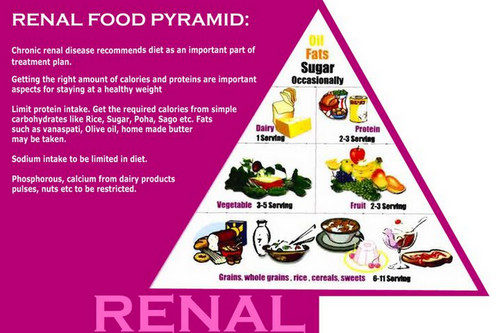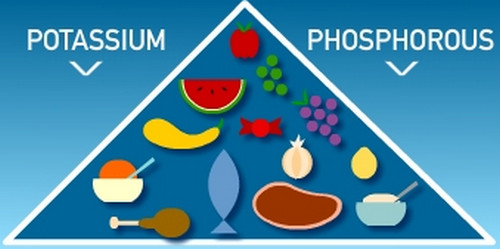Renal Diet
Last reviewed by Dr. Raj MD on January 12th, 2022.
The kidneys are bean-shaped organs that are about five inches long and almost a size of a large fist. They play a vital role in various bodily mechanisms.
Their functions are to remove waste from the body, filter the blood, and regulate fluid balance in the body. Kidneys also maintain the normal level of electrolyte. Hence, it is important to keep the kidneys healthy.
If there is an abnormality in the kidneys such as in chronic kidney disease, the kidneys will lose its ability to maintain fluid in the body. Fluid and electrolyte imbalances take place. Therefore, people with impaired kidneys should follow a strict renal diet. (1, 2, 3)
What is renal diet?
It is a diet that is low in sodium, protein, and phosphorus. Certain fluid intake should be limit and stresses the importance of include high quality protein in the diet. In some instances, the patient’s intake of potassium and calcium should be tapered too.
Every person is unique and the severity of the kidney disease varies from one person to another. Hence, it is important to work closely with a dietician to thoroughly and accurately monitor the patient’s food intake. (3, 4)

Photo 1: The renal food pyramid, a guide to people with renal disease.
Picture Source: i.pinimg.com

Image 2: Foods rich in potassium and phosphorus.
Photo Source: 4.bp.blogspot.com
What substances should be closely monitored in patients with renal problems?
Sodium
It is a mineral naturally found in foods. It is one of the major electrolytes in the body. It plays an essential role in regulating blood pressure and blood volume. It maintain an acid-base balance of the blood, regulates nerve function and contraction of the muscles, and maintains balance in retention and excretion of fluids.
However, excessive sodium in the body can be extremely dangerous in patients with kidney disease. An impaired kidney loses its ability to excrete excess fluid and sodium from the body. Too much sodium in the body increases thirst, increases blood pressure, causes swelling especially in the legs, hands, and face.
Potassium
It is a mineral present in the body and in many foods. Potassium keeps the normal beating of the heart. It also keeps the muscles working correctly. It plays an important role in maintaining fluid and electrolyte balance.
Impaired kidneys cannot thoroughly filter potassium. A high level of potassium in the blood causes muscle weakness, irregular beating of the heart, low pulse rate, heart attack, and even death. (4, 5, 6)
Phosphorus
It is crucial in the development of bones. It also plays an important role in connective tissues development and aids in the movement of the muscles. Ideally, the small intestines absorb phosphorus and stored in the bones.
Excess phosphorus can be harmful to the body. An impaired kidney will not be able to excrete the excess number of phosphorus. Eventually, the bones will be weak because the excess number of phosphorus pulls out the calcium from the bones. (7)
Protein
When a person ingests protein, a waste product will be created and it will be filtered by the kidneys. However, damaged kidneys cannot do this function. Eventually, protein waste will accumulate in the blood. As you know, anything in excess is not good.
Fluids
Patients with kidney disease should control their fluid intake. Those with chronic disease need to undergo dialysis in order to remove the excess fluid in the body.
Not controlling the fluid intake leads to fluid build-up, which can be very dangerous to patients with chronic kidney disease. (1, 7)
Renal Diet Food List (Menu)
Patients with renal disease should strictly adhere with renal diet guidelines. There are renal diet restrictions. You need to know what foods to eat and what should be completely avoided. What can you eat on a kidney diet? (8, 9)
Fruits and vegetables are very good for renal patients. There are a variety of fruits and vegetables for renal diet. They protect the kidneys of patients with chronic kidney disease. They alkalize the body and reduces the acidity level significantly. Fruits and vegetables for renal diet includes:
- Eggplant
- Lettuce
- Bean sprout
- Celery
- Asparagus
- Grapes
- Mangoes
- Blueberries
- Peaches
- pears
What should you eat if you have kidney disease?
- Cabbage – It contains phytochemicals that can break up free radicals before they can even harm the body. Phytochemicals are shields against cancer and good for the heart. It contains vitamin C and K.
- Bell peppers – The red bell pepper is perfect for patients with renal disease because it contains low potassium and a great source of essential vitamins such as vitamin A, B6, and C.
- Onions – They are low in potassium and high in chromium.
- Coriander – it is packed with fiber, calcium, iron, manganese, and selenium, which are not only good for the kidneys but for the whole body too.
- Egg white – It is a perfect addition to chronic renal failure diet. It contains all essential amino acids, which makes it the highest form of protein. The protein it provides contains less phosphorus, in fact, lesser than meat and egg yolk.
- Fish – It contains high quality protein and healthy fats. Choose high quality fish such as tuna, salmon, and mackerel. (10, 11, 12)
Renal diet foods to avoid list
There are certain food groups patients with renal impairment should avoid. Renal diet restrictions include the following:
- Processed meat – Cold cuts should be completely avoided such as ham and bologna. The reason is that processed foods contain a high level of sodium and nitrates, which are not only bad for your kidneys but for your overall health.
- Soda – It does not have nutritional benefits and is loaded with sugar. Scrap soda and replace it with water. You can add lemon or slices of cucumber to water to make it more refreshing.
- Frozen meals – as much as possible, you should stay away from frozen meals like pizza and microwavable dinners. Why? They are loaded with sodium, fat, and sugar. If you are going to eat frozen meal, make sure you carefully read the label and choose the one that has low sodium. If possible, you should add fruits and vegetables to achieve a well-balanced diet.
- Mayonnaise – It is high in sodium, sugar, and fat. A tablespoon of mayonnaise contains 103 calories. Replace mayonnaise with a healthier option such as a non-fat Greek yogurt. It is high in protein and perfect for salads. (4, 7, 8, 10)
What can you do to help your kidneys function better?
How do you keep your kidneys healthy? Is there a way to prevent kidney-related diseases? Below are the recommended ways to keep your kidneys healthy and free from diseases.
- Keep your body hydrated – For your kidneys to function properly, you should keep it hydrated. Drink plenty of water and natural fruit juices.
- Eat healthy foods – Make sure you eat a well-balanced meal to ensure your body is getting all the nutrients it needs. Increase your intake of fresh fruits and vegetables and limit your intake of fatty and salty foods.
- Maintain a healthy lifestyle – Living a healthy lifestyle is the key to good health. As much as possible, you should limit your intake of alcoholic beverages. Do not smoke. Excessive alcohol drinking and smoking cause high blood pressure, which will eventually lead to kidney disease.
- Maintain a healthy weight – Obese people have high blood pressure, which have a negative effect to kidneys. Hence, it is a must to maintain a healthy weight. Lead an active lifestyle and avoid overeating. (2, 4, 5, 7)
References:
- https://www.davita.com/kidney-disease/vocabulary/kidney-diet/e/5493
- https://nephcure.org/livingwithkidneydisease/diet-and-nutrition/renal-diet/
- https://www.davita.com/kidney-disease/diet-and-nutrition/lifestyle/top-15-
- healthy-foods-for-people-with-kidney-disease/e/5347
- https://www.belmarrahealth.com/renal-diet-foods-eat-avoid-kidney-failure/
- http://www.ika.ie/education/renal-diet
- https://www.vcuhealth.org/media/file/renal_diet.pdf
- http://www.winchesterhospital.org/health-library/article?id=573267
- http://www.mayoclinic.org/diseases-conditions/chronic-kidney-disease/expert-answers/renal-diet/faq-20058205
- http://www.kidneycommunitykitchen.ca/dietinformation/renalfaqs/
- https://www.drugs.com/cg/chronic-kidney-disease-diet.html
- https://www.marthasseniorgourmet.com/renal
- https://myhealth.alberta.ca/Health/aftercareinformation/pages/conditions.aspx?hwid=uh4530